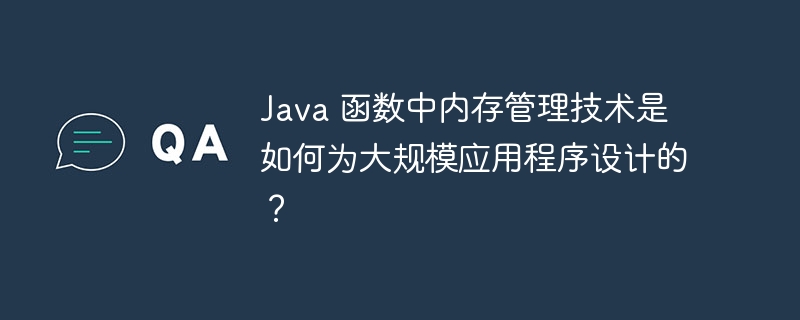
Powerful memory management techniques in Java functions include: Automated garbage collection: Automatically release memory for objects that are no longer used, eliminating the need for manual management. Active memory management: Provides technologies such as WeakReference, SoftReference, and PhantomReference to actively manage memory under specific circumstances. Practical case: Demonstrate how to use WeakReference to effectively manage memory for cached data.

Memory management technology in Java functions, the gospel of large-scale applications
When building large-scale applications, memory management Crucial. Java provides powerful memory management techniques for handling large amounts of data and complex applications. This article will take an in-depth look at these techniques used in Java functions and demonstrate their application through a practical case.
Garbage Collection in Java
Java uses a garbage collector to automatically release memory occupied by objects that are no longer used. This eliminates the need to manually manage memory, making it ideal for large-scale applications.
Garbage collection in Java has the following advantages:
Active Memory Management
Although Java's garbage collection is powerful, active memory management is sometimes required for certain situations. For example, when an application must deal with a large number of short-lived objects.
Java provides some proactive memory management techniques:
Practical Example: Effective Memory Management of Cache Data
Consider an application that caches a large number of objects. When the cache reaches its capacity, old objects need to be deleted to make room. Use WeakReference to remove an object from the cache as soon as it is no longer accessed.
The following code shows how to use WeakReference:
import java.util.WeakHashMap;
public class Cache {
private final WeakHashMap<Object, Object> cache = new WeakHashMap<>();
public void put(Object key, Object value) {
cache.put(key, value);
}
public Object get(Object key) {
return cache.get(key);
}
public void clear() {
cache.clear();
}
}In the above code, WeakHashMap is used to store cache entries. WeakReference automatically removes an object from the cache when it is no longer accessed.
By leveraging memory management techniques in Java functions, large-scale applications can improve performance and reliability by automating memory release, as well as proactively manage memory under specific circumstances.
The above is the detailed content of How are memory management techniques in Java functions designed for large-scale applications?. For more information, please follow other related articles on the PHP Chinese website!
